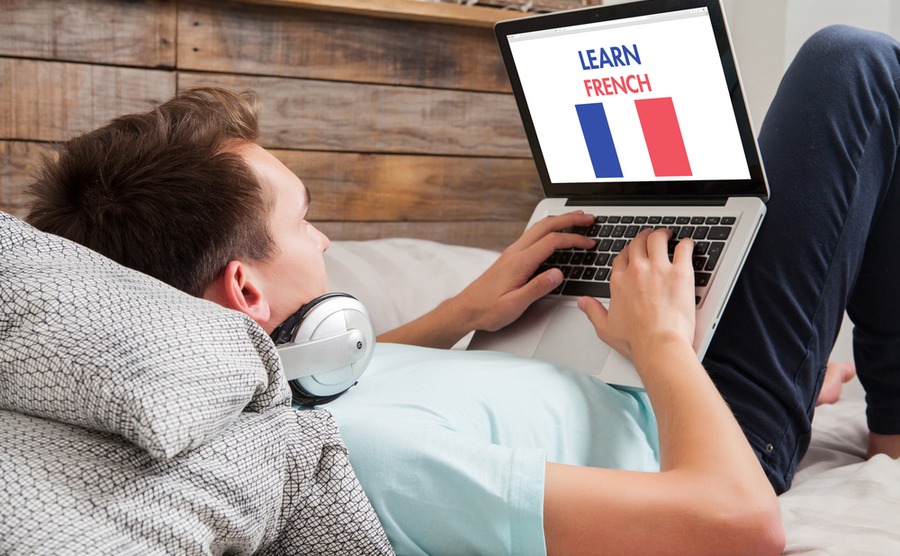So you’re heading off on that property viewing trip. At last! But when a long-cherished dream gets real, you might suddenly feel far from your comfort zone, and very foreign. Learning a little bit of French puts you in control. But which is the best way to learn? Christopher Nye investigates your options for learning French for property buyers.
Do you know your pièces from your chambres? Your plain pied from your piscine? Even with some terrific translation software, learning a bit of French can only help when you come to look for property in France. Or should we say “relearn”? Because most of us spent many hours at school learning French. Maybe we even gained a GCSE or ‘O’ level in it (full confession, ‘O’ Level Grade B, 1980), so surely it should be easy? I’ve been looking into four different ways to learn French for property buyers.
Find homes in France via our property portal.
Online learning

Learning online, perfect for taking it at your own pace!
I checked out a well-established system for learning French – Frantastique. Here’s how it works. You’re sent a lesson via email each day. Each takes about 15 minutes to complete. You watch a brief video and then answer questions on it. The first seven lessons, which are part of a free trial, as well as being good fun, are checking your ability via Frantastique’s AI (artificial intelligence) system. So that when you do come to pay the lessons are accurately tailored to your ability.
Some of the questions were multiple choice while others you had to type in the correct French. Although the instructions are all in French, you can click for an English translation if you need it. Then when you do the next day’s lesson, the AI system chucks in a question on what you got wrong yesterday. So there’s no excuse, and no escape!
What I liked about it:
It’s beautifully aimed at my sort of person – with a witty and ironic style. For example, the opening section on verbs recognises that verb endings are where many of us still have nightmares from school. So it says: “Remember, these verbs are as frightened of you as you are of them.” It’s full of interesting factoids and cultural references. The first lesson included references to Serge Gainsbourg, Napolean, Edith Piaf and Victor Hugo. It’s for grown ups who are interested in France, not just trying to pass an exam.
You also have a “spicy mode” that includes commonly used vulgarities. Great news for those of us who fondly remember the first rather risque French dictionary, Le Gimmick by Adrienne.
If you want to turbo-charge your French, we’ve got some good news – or some bonnes nouvelles – for you. Leading French learning providers Frantastique are offering a free one-month trial for Property Guides readers. Simply activate your trial and join their community of 3,000,000 learners worldwide!
In-country courses

Learning French in a class in France can be immersive
Learn French and haute cuisine in Carcassonne, French and oil painting in Aix-en-Provence, French and huskie driving in Quebec… If you have the money, a week spare and a sense of adventure the world is your huître, or le monde est ton coquillage, as they actually say in France.
There is a dizzying range of courses. The biggest difference is between those aimed at professionals being sent by their employer and those aimed at holidaymakers. Property buyers may value either.
Why not spread the cost and buy with family? Read our guide, Buying with Family
Professional courses
The more business-like courses, freed from the distractions of cooking and huskies, will tend to have far more intensive lessons. You can choose the length of classes each day – maybe just do mornings, for example – and the class size.
A benefit of learning this way is that it tends to be totally immersive. Nothing may be said in English at all. How successful it is, and whether the hours spin past or the minutes drag, largely depends on the quality of the teaching. On my course the teacher was so fun and engaging I was tempted to bring an apple in for her.
Accommodation will tend to be more serviceable than for a holiday course, normally as the guest of a local family. The benefit of that is you’re more likely to practice French when the class is over, and will get more of a feel for the people and the area. The downside is that you may find yourself, as I did, using the single bed of a child who has left home, and sharing the bathroom. But you can choose your level, up to a point. For example, one course being offered today gives you the option of paying £320 with a host family and private bathroom, or £267 with a shared bathroom.
You can also choose whether to eat with the family or to make your own arrangements. On my course I chose to have the meals offered and rather regretted it!
Some such courses can be extremely expensive – we have seen prices of €3,000 per week. But you can drastically reduce this by going off-season. Under €1,000 per week including accommodation would be more normal and under €400 without accommodation.
Why not opt for a lesson in the morning and spend the afternoon property hunting?
Holiday courses
On courses aimed at vacationers the accommodation choices should be better and the focus will be on fun. But again, there is such a range of holidays on offer that you can pay your money and take your choice.
The downside of such holidays from a language point of view is that you will tend to be there for fun and friendship. And after a few hours of speaking French you may want to relax with a glass/bottle of wine and set the world to rights in English.
For property hunters, however, why not opt for a lesson in the morning and spend the afternoon property hunting?
If you are ready to buy in France within the next few months, call our friendly France Resource Team on 020 7898 0549 or email [email protected].
Learning from books

Learning French from a book
It’s always possible that someone who takes themselves on a “French and Interpretative Dance” course in Montpellier is trying to avoid the hard slog of learning verb endings!
For a cheap and instant way of learning French, you can always just open a book. There are plenty of modern textbooks at your local WH Smiths, or you can even find old French textbooks for that authentic school experience. Those pages of verb endings, gradually building up from pluperfect to subjunctive, can be oddly comforting. This may suit those who have become comfortable in the basics of the language but want to avoid making mistakes. After all, the French will be forgiving of those who are new to French, but why not become properly fluent and proficient if you can?
For beginners, simple techniques such as writing the French names for things on Postit notes around your house can really work, especially for property buyers.
You won’t get much help with the accent and pronunciation that way, but you can always put French radio on in the background to put you in the mood as you do your studying.
Give it a go!
In the end, you just have to open your mouth and speak. Then, when no-one understands you, you have to open your mouth in a slightly more French way so that the accent comes out properly.
You can do it. The words are probably tucked away in your brain somewhere. I once sailed to France after a long period away from the country and language and found myself in Cherbourg looking for seasickness tablets. As you do. In the first chemist I tried to ask for them and got embarrassed when I couldn’t remember the words, and fled. After a coffee and a quick talking to myself I tried a second, and managed to mutter random words along the lines of mal de mer…, je voudrai… to a bemused pharmacist, before fleeing again. But by the third I was ready, launching into a confident, “Ah, bonjeur monsier le pharmaciste! J’ai mal de mer et j’ai besoin de… um, tablets.” Now, it may have been nonsense, but at least it sounded French.
Learning some French before you go will boost your confidence when viewing property. So will knowing How to Negotiate Abroad. Read our free guide for some advice from estate agents.










